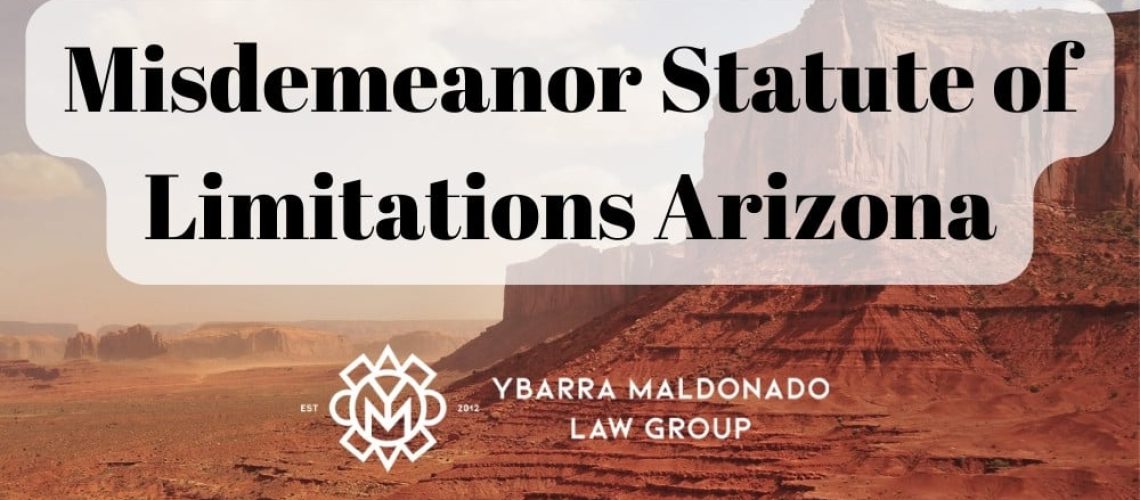You’ve probably heard of a statute of limitations for personal injury cases, but did you know there is also a statute of limitations for pursuing criminal charges against someone? Although the time limits vary depending on the type of crime, both petty offenses and serious felonies must be charged within a certain period of time. If you’ve been charged with a misdemeanor in Arizona, this blog discusses the misdemeanor statute of limitations Arizona.
At Ybarra Maldonado Law Group, our Phoenix criminal defense lawyers have years of experience defending the wrongfully accused, getting charges dropped, and negotiating lesser penalties. Arizona is well-known for being quick to file criminal charges, and the penalties are often steep. Don’t risk your future and your freedom by working with an unseasoned law firm. Contact YMLG at 602-910-4040 to schedule a case evaluation with a skilled defense attorney.
Why Do Criminal Statutes of Limitations Exist?
It may seem counterintuitive that criminal charges have a limitations period during which they must be prosecuted. However, there is a very important reason for this. Evidence becomes less reliable over time and memories fade. Because of this, setting a statute of limitations for offenses punishable by law protects the rights of the accused.
With time, it becomes much harder to both prosecute and defend criminal charges, no matter the specific criminal offense. Eyewitness accounts are already a fairly unreliable form of evidence, but it becomes increasingly unreliable with time. If no statute of limitations existed for certain crimes, someone could easily be subject to unfair prosecution. This is true for both misdemeanor and felony offenses.
Do All Crimes Have a Statute of Limitations in Arizona?
No. Specific criminal charges in Arizona have no statute of limitations, meaning the state can file charges at any time. The Arizona Revised Statutes outline that the following types of criminal cases have no statute of limitations.
- Violent sexual assault
- Felony sex offenses
- Violent crimes
- Negligent homicide
- Unlawful sexual conduct with a minor
- Sexual exploitation of a minor
- Falsifying public records
- Sex trafficking
- Other sexual crimes
- Other serious offenses
Not all crimes have time limits during which the state must file charges, but most of them do. Those who commit a petty offense can only have a criminal case brought against them within one year. If a person were to commit homicide, however, there is no time limit according to the Arizona Criminal Statute.
Many of the same crimes that do not have statutes of limitation are subject to the Arizona 3 strikes law. The three strikes law intends to punish habitual offenders. After being convicted of three serious offenses, other than drug offenses, the 3 strikes law may make an offender eligible for life in prison.
Criminal Statutes of Limitations vs Civil Statutes of Limitations
What is the difference between criminal and civil statutes of limitations? They both operate in the same ways, and they can both have specific exceptions or extensions of the time limits. In criminal cases, the statute of limitations defines how long prosecutors have to bring criminal charges. In civil cases, the time limit defines how long a plaintiff has to file a lawsuit against a defendant.
Is There a Statute of Limitations on Misdemeanors in Arizona?

Yes. In general, the state has a one-year statute of limitations to pursue misdemeanor charges against someone. Keep in mind that there are exceptions to this rule for both felony and misdemeanor charges. For example, if the suspect has fled Arizona, or if they cannot be found in the state, the statutory period can be extended by the prosecution.
Additionally, if the state has not discovered a crime for a certain period of time, the applicable time period can be extended by the prosecution. The time limitation also does not run if the identity of the suspect is unknown to the state. If you’re facing criminal charges for aggravated assault, armed robbery, or other offenses, we recommend speaking with a knowledgeable attorney about your case.
Statute of Limitations to File a Misdemeanor in Arizona
As we mentioned previously, Arizona has a one-year criminal statute of limitations for most misdemeanors. Most felonies, however, have a time limit of seven years. Furthermore, certain crimes, such as violent sexual assault, first-degree murder, and second-degree murder do not have a criminal statute of limitations. In these certain instances, prosecutors can file charges at any time.
Can the Time Limit Be Extended?
Technically, yes. These time limits heavily depend on what we call the Discovery Rule. In other words, when the state discovers the crime or when they should have discovered the crime after reasonable diligence, this begins the countdown. So, if they were to discover a crime six months after its commission, they can still press charges for up to a year after the discovery.
Other very specific situations and crimes exist that might affect how the statute of limitations applies. If you’re unsure of the remaining time frame for your case, consider contacting a skilled defense attorney. We can evaluate the facts of your case and determine whether or not the statute of limitations has passed.
Statute of Limitations for Misdemeanor DUI in Arizona
DUI charges tend to be a little more complicated than other crimes in terms of how the cases proceed. However, the statute of limitations remains the same. The state has one year to file misdemeanor DUI charges, and seven years to file felony DUI charges. If you’re facing charges for driving under the influence of drugs or alcohol, contact the Phoenix DUI lawyers at YMLG.
Experienced Phoenix Criminal Defense Lawyers
At Ybarra Maldonado Law Group, we understand that even minor criminal charges can change the entire course of your life. A criminal record could affect your career, your housing opportunities, and even your personal life. That’s why we dedicate ourselves to helping Arizona residents fight for their rights and freedoms. Arizona has harsh penalties and sentences for many crimes. Contact an experienced criminal defense lawyer with our firm for dedicated, aggressive representation in your case. To schedule your case evaluation with us, please call 602-910-4040 today.


